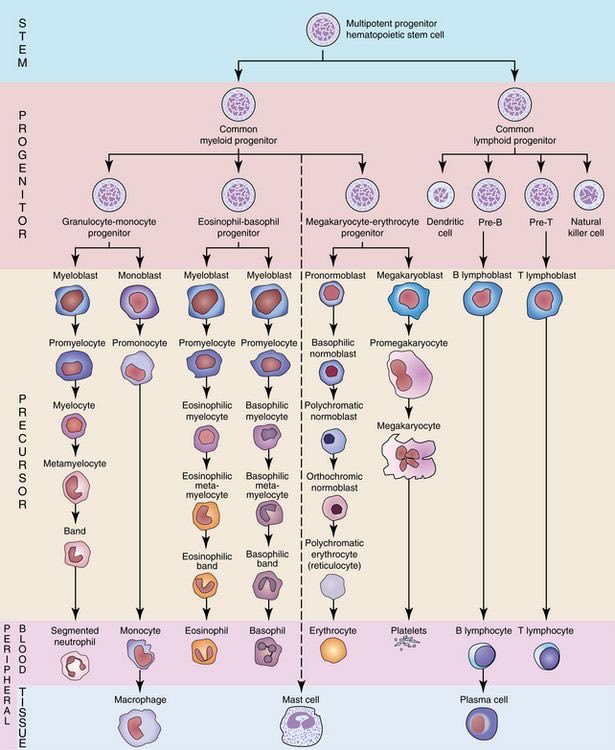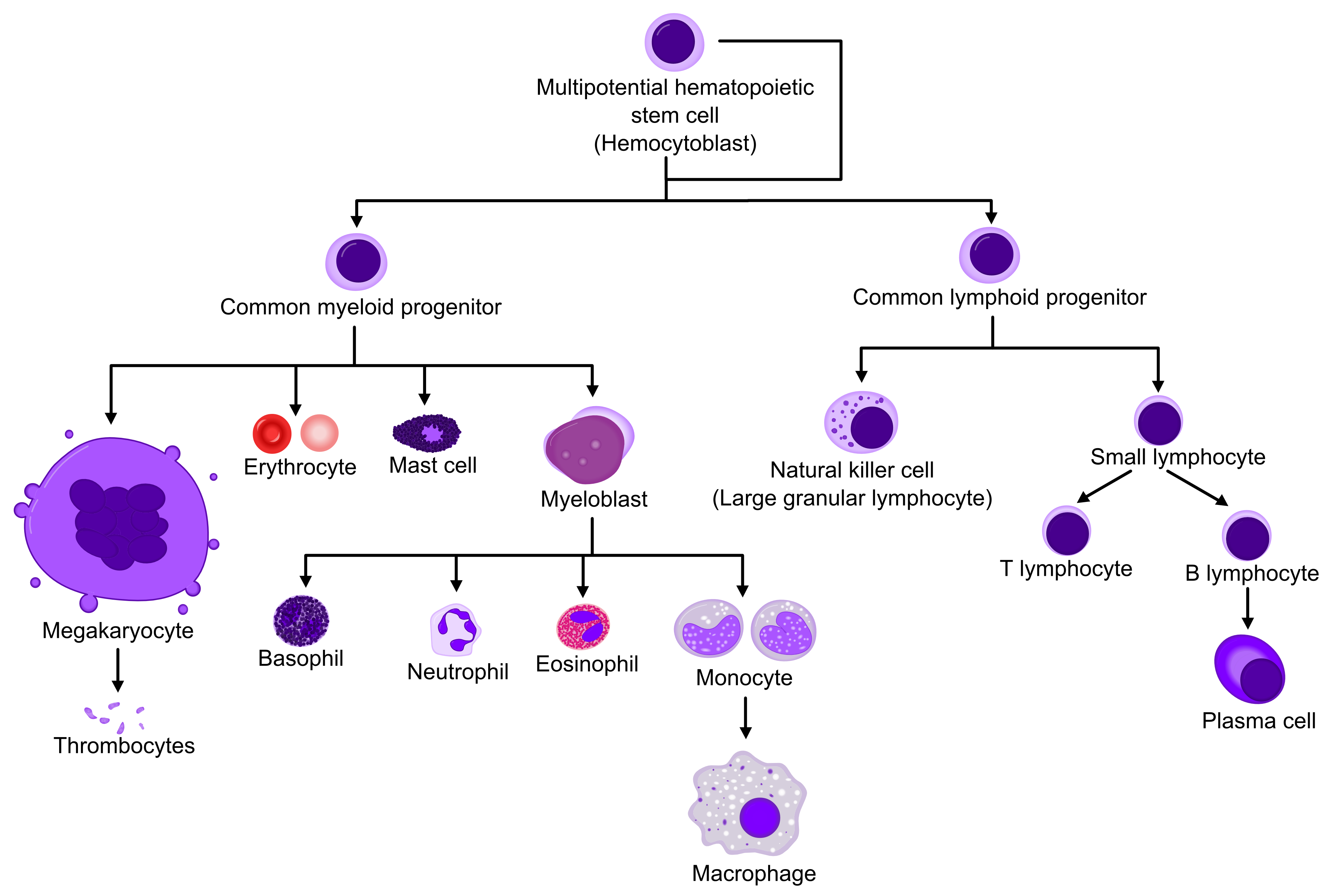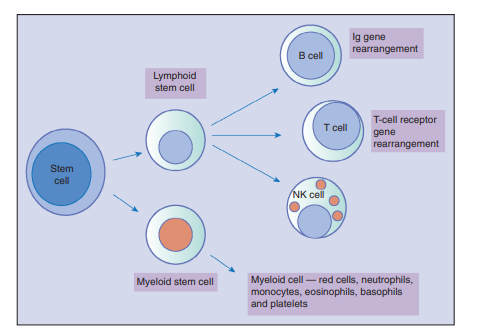Makindo Medical Notes"One small step for man, one large step for Makindo" |
|
|---|---|
| Download all this content in the Apps now Android App and Apple iPhone/Pad App | |
| MEDICAL DISCLAIMER: The contents are under continuing development and improvements and despite all efforts may contain errors of omission or fact. This is not to be used for the assessment, diagnosis, or management of patients. It should not be regarded as medical advice by healthcare workers or laypeople. It is for educational purposes only. Please adhere to your local protocols. Use the BNF for drug information. If you are unwell please seek urgent healthcare advice. If you do not accept this then please do not use the website. Makindo Ltd. |
Haemopoiesis
Related Subjects: |Neutrophils
Haemopoiesis (or hematopoiesis) is the process of formation, development, and differentiation of blood cells. This process is vital for maintaining the body's supply of erythrocytes (red blood cells), leukocytes (white blood cells), and thrombocytes (platelets). Haemopoiesis occurs primarily in the bone marrow in adults, but during fetal development, it occurs in various tissues, including the liver and spleen.
Sites of Haemopoiesis
- Fetal Development :
- Yolk Sac : The initial site of blood cell formation during the first few weeks of embryonic development.
- Liver and Spleen : Major sites of haemopoiesis from the second to seventh month of fetal life.
- Bone Marrow : Begins to take over as the primary site of haemopoiesis in the last trimester and continues throughout life.
- Postnatal Life :
- Bone Marrow : The main site of haemopoiesis in adults, primarily in the pelvis, vertebrae, sternum, and ribs.
Diagrams showing Myeloid vs Lymphoid lines


Stages of Haemopoiesis
- Hematopoietic Stem Cells (HSCs) :
- Multipotent stem cells that have the ability to differentiate into all types of blood cells.
- Self-renewing cells that maintain the stem cell pool throughout life.
- Progenitor Cells :
- Derived from HSCs and committed to differentiating into specific lineages of blood cells.
- Two main types: Common Myeloid Progenitors (CMPs) and Common Lymphoid Progenitors (CLPs).
- Precursor Cells :
- Intermediate cells that are further along in differentiation and give rise to mature blood cells.
- Mature Blood Cells :
- Fully differentiated and functional blood cells.
Lineages of Haemopoiesis

- Myeloid Lineage :
- Gives rise to erythrocytes, megakaryocytes (which produce platelets), granulocytes (neutrophils, eosinophils, and basophils), and monocytes (which differentiate into macrophages and dendritic cells).
- Lymphoid Lineage :
- Gives rise to lymphocytes, including B cells, T cells, and natural killer (NK) cells.
Regulation of Haemopoiesis
- Growth Factors and Cytokines :
- Erythropoietin (EPO) :
- Produced by the kidneys in response to hypoxia.
- Stimulates the production of erythrocytes.
- Granulocyte Colony-Stimulating Factor (G-CSF) :
- Stimulates the production of granulocytes, particularly neutrophils.
- Granulocyte-Macrophage Colony-Stimulating Factor (GM-CSF) :
- Stimulates the production of both granulocytes and macrophages.
- Thrombopoietin (TPO) :
- Produced primarily by the liver and stimulates the production of megakaryocytes and platelets.
- Interleukins (ILs) :
- Various interleukins, such as IL-3, IL-5, and IL-7, play roles in the differentiation and proliferation of different blood cell lineages.
- Erythropoietin (EPO) :
- Bone Marrow Microenvironment :
- Provides the necessary support and signals for HSC maintenance and differentiation.
- Includes stromal cells, extracellular matrix proteins, and a network of blood vessels.
Clinical Relevance
- Anaemia :
- A condition characterized by a deficiency in red blood cells or haemoglobin, leading to reduced oxygen transport.
- Causes include iron deficiency, vitamin B12 deficiency, chronic diseases, and bone marrow disorders.
- Treatment depends on the underlying cause and may include dietary supplements, medications, or bone marrow transplantation.
- Leukaemia :
- A type of cancer affecting the blood and bone marrow, characterized by the uncontrolled proliferation of abnormal white blood cells.
- Types include acute lymphoblastic leukaemia (ALL), acute myeloid leukaemia (AML), chronic lymphocytic leukaemia (CLL), and chronic myeloid leukaemia (CML).
- Treatment options include chemotherapy, radiation therapy, targeted therapy, and bone marrow transplantation.
- Thrombocytopenia :
- A condition characterized by abnormally low levels of platelets, leading to increased risk of bleeding and bruising.
- Causes include bone marrow disorders, autoimmune diseases, and certain medications.
- Treatment may involve addressing the underlying cause, platelet transfusions, or medications to boost platelet production.
- Bone Marrow Transplantation :
- A medical procedure used to treat certain cancers, blood disorders, and immune deficiencies by replacing damaged or diseased bone marrow with healthy hematopoietic stem cells.
- Can be autologous (using the patient's own cells) or allogeneic (using cells from a donor).
Summary
Haemopoiesis is the complex process by which blood cells are produced, developed, and differentiated in the bone marrow. It involves a hierarchical organization of stem cells, progenitor cells, precursor cells, and mature blood cells, regulated by various growth factors and the bone marrow microenvironment. Understanding haemopoiesis is essential for diagnosing and treating blood-related disorders and for the successful application of therapies such as bone marrow transplantation.